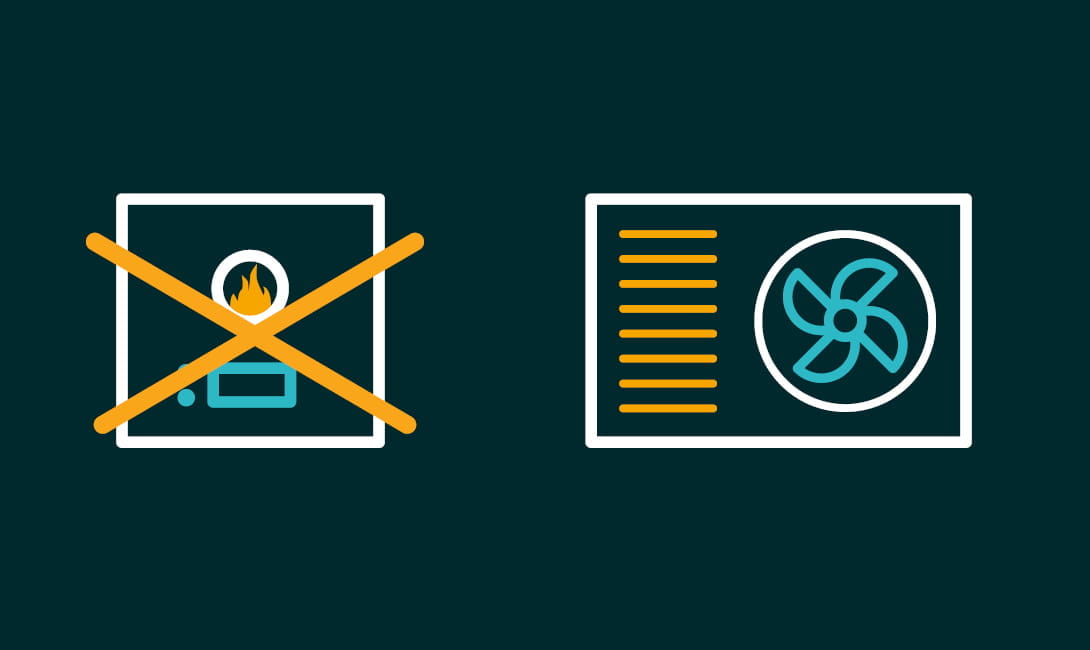- Reducing footprint
- Work smarter
- Energy saving
- Insights
How does the gas boiler ban affect the HVAC system?
Gas boiler ban in the EU
When exactly the gas boiler ban will come into force differs from country to country. In the Netherlands, for example, all central heating boilers that break down from 2026 will have to be replaced by a heat pump. Germany is even faster as anyone installing a new heating system from 2024 onwards will have to choose a system that uses at least 65% renewable energy. Regardless of the timeline, it’s a fact that gas boilers will be phased out and alternatives need to be considered.Alternatives for gas boilers
Low carbon alternatives that are encouraged to help phase out fossil fuels include biomass boilers, solar thermal panels and hydrogen ready boilers. However, the main focus is on heat pumps as a replacement for gas boilers. This can either be a ground source heat pump or an air source heat pump, such as our Zento heat pump.
Heat pumps run on electricity instead of oil or gas, and can operate more efficiently than a traditional boiler, if certain basic conditions are met. Most important is the supply temperature, which should be as low as possible. This, in turn, correlates with the energy level of the building since a higher thermal insulation standard allows for a lower flow temperature in the heating system and ensures a higher efficiency or annual performance factor of the heat pump.
If the heat pump is paired with solar panels, it can easily be powered with free self-generated electricity. That’s a win for the environment and the energy budget of the end user.
Preparation is key to beat the gas boiler ban
For those who want to get ahead of the gas boiler ban, preparation is key. Especially in properties with poor insulation or older radiators some extra effort is required, as the heat emitters need to be adapted to low system temperatures. Such a heating system is more energy efficient but it does mean that the radiators might need to be resized and the insulation has to be brought up to current standards.
Heat pump radiators
In the past, underfloor heating, which manages with system temperatures of about 35°C, was the emitter of choice to combine with a heat pump. Thanks to technological advancement, an underfloor heating system is no longer a must. Modern panel radiators can also be operated at comparatively low temperatures (e.g. 45°C). Whether or not the radiators need to be larger dimensioned depends on the insulation level of the building. Additionally, there are also fan-assisted solutions that can be operated at temperatures lower than 45°C. Heat pumps can therefore be used efficiently with both underfloor heating systems and radiators.
Our Ulow E2 or the iVector S2 fan convector offer an interesting choice for flow temperatures lower than 45°C.
The Ulow E2 was developed especially for heating systems with ultra-low temperatures of 35°C. It’s equipped with integrated fans which allow the convection heat to be distributed better throughout the room so that the temperature setting can be lower. Thanks to the innovative E2 technology the controller automatically switches on the fans when needed to improve the heat distribution. The integrated fans operate silently and increase the performance of the radiators by up to 60%.
The iVector S2 is also a great match for a heat pump as it offers a high heat output at lower system temperatures. When paired with a reversible heat pump, this fan convector doesn’t only provide pleasant warmth in winter but also a cool breeze in summer. This way, users can enjoy a comfortable indoor climate year-round while saving on their energy bills and doing their but or the environment, all at the same time.
Do you need help finding the right answer to the gas boiler ban for your project or property? Don’t hesitate to contact us. We will be happy to help you future-proof your HVAC system.

